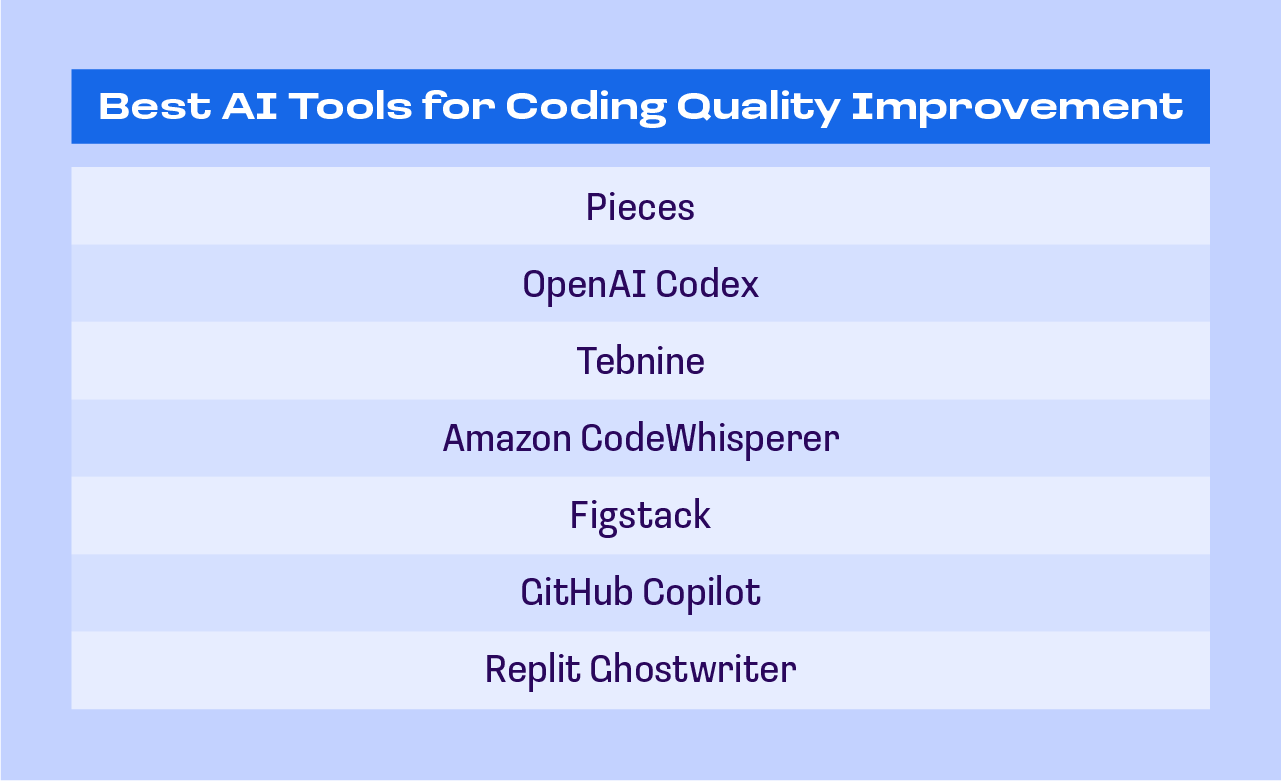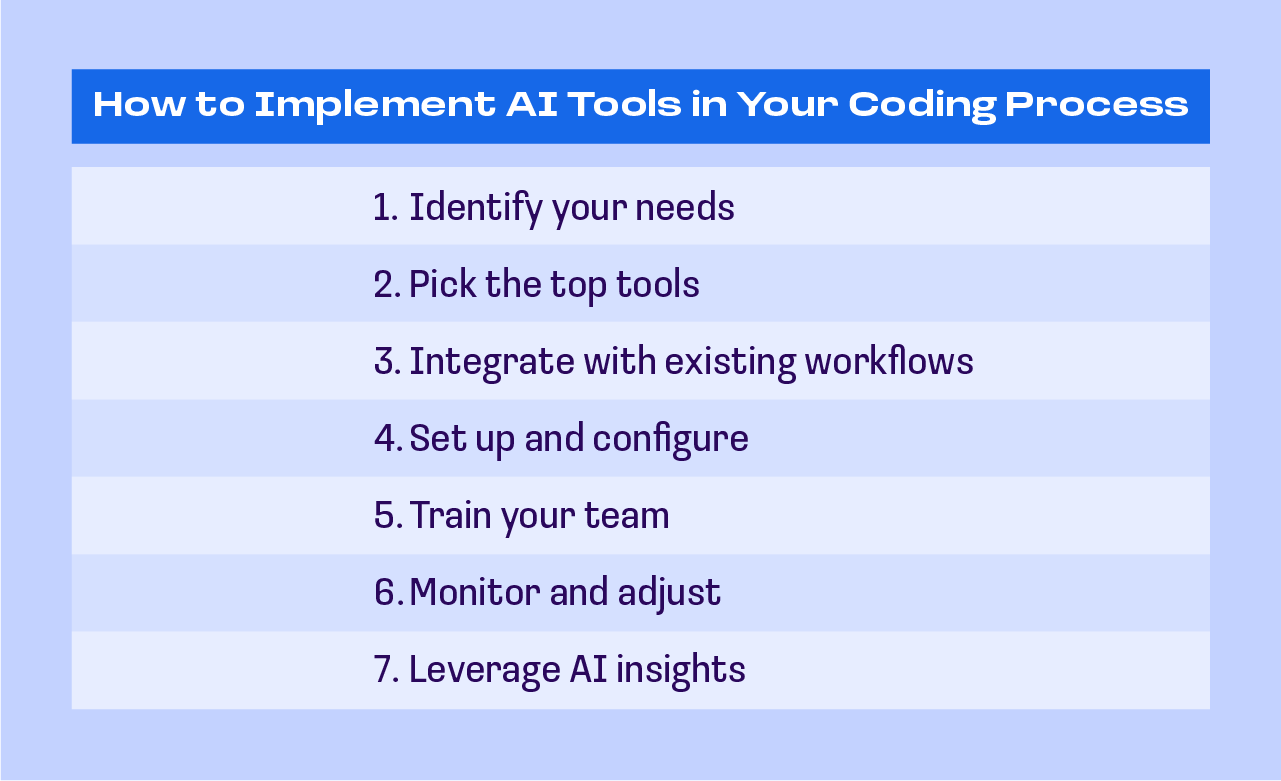Best AI for Code Quality: Tools and Ways to Implementation
The author of this article is tech expert Pieter Murphy. Invited expert — Senior Engineering Manager at EPAM, the creator of AI-Supported Software Engineering course Aliaksandr Trafimenka.

Why Code Quality Is So Important and How AI Can Help
Code quality is important as it improves readability, reliability, effectiveness, maintainability, and reusability. It helps to reduce and prevent issues such as bugs and security vulnerabilities.
Focusing on high-quality code allows developers to easily read, understand, and modify it. In the current global market, code quality is the key differentiator for various products and services on digital platforms and can, therefore, be leveraged to build trust and customer loyalty.
Software developers’ ability to enhance code quality evolves with technological advancement. Artificial Intelligence (AI) is at the forefront of the next great leap.
AI for developer productivity has emerged as a powerful tool capable of vastly improving developers’ code quality. AI uses machine learning algorithms to identify issues, conduct automated code analysis, and provide recommendations for optimization and coding standards.
Let’s discuss various scenarios where innovative AI used for coding can be utilized to enhance code quality.
Code Generation
Generative AI in software development simplifies development tasks and provides developers with smart suggestions and code snippets which significantly reduce learning curves and coded curves required for new technologies. Making the process easy helps developers to boost productivity.
Code Review
AI-powered code review tools complement human reviewers and enhance the code review process efficiency. They help by automatically identifying potential problems and ensuring coding standards, allowing human reviewers to focus on more critical aspects of the code. This partnership between specialists and AI helpers generates high-quality software.
They let human reviewers focus on coding aspects that are more critical. This partnership between AI and human reviewers helps to generate high quality software.
Performance Optimization
AI software for coding can help identify performance bottlenecks by finding areas that use more memory than needed or run slowly. After they have been identified, AI will suggest better memory usage or refined algorithms, leading to enhanced code efficiency.
Bug Detection
Bugs pose a challenge for developers and require significant time and effort to fix. AI helps with this by identifying potential errors and analyzing data flow, syntax, and code patterns.
Aliaksandr Trafimenka, the senior manager leading innovative projects and mentoring tech talent at EPAM, offers the following insight on how to improve code quality with artificial intelligence in testing:
AI offers several impactful ways to enhance code quality, making the development process more efficient and error-free.
Tools like GitHub Copilot provide real-time suggestions. As developers write code, Copilot offers context-aware snippets, entire functions, and corrections. This helps developers write cleaner, more efficient code from the start, reducing the likelihood of errors and improving the overall quality of the codebase.
For review, AI tools such as ChatGPT can analyze code, identify potential issues, and suggest improvements. This automated review process ensures that coding standards and best practices are consistently followed, catching errors and inconsistencies that might be missed in manual reviews.
AI also plays a crucial role in debugging. AI-powered debugging tools can quickly pinpoint problems in the code and offer solutions or suggestions for fixes. This rapid identification and resolution of issues help maintain a stable and reliable codebase, speeding up the development process.
In addition, AI can automate the generation of unit tests and test data, ensuring comprehensive testing coverage. By automatically creating thorough test cases, AI helps in identifying edge cases and potential bugs early in the development cycle.
Furthermore, AI can assist in maintaining accurate and up-to-date documentation. Tools that generate and update documentation automatically ensure that all aspects of the code are well-documented. This not only helps new developers understand codebase more quickly but also ensures that any changes in the code are reflected in the documentation, reducing the risk of outdated or incorrect information.
By leveraging these AI capabilities, developers can significantly enhance code quality. These tools help write better code, catch issues early, maintain high standards, and ensure thorough testing, all of which contribute to creating more reliable and maintainable software.
Benefits of Artificial Intelligence in Code Quality Assurance
Here are some of the primary advantages of using AI in software development’s quality assurance efforts:
- Reduced testing: AI can automate test case generation and execution, , serving as a helper that cuts down on manual work and saves time.
- Longer traceability: AI lets you keep detailed documentation and tracking of changes and problems throughout the whole development process.
- Predictive analytics: AI looks at past data to predict where bugs might pop up before they happen, helping to solve problems.
- User experience (UX): AI can simulate user interactions to find UX problems and make users happier overall.
- Integration with modern development practices: AI tools for coding work well with agile and DevOps methods making teamwork and work flow better.
- Resource optimization: AI optimizes test execution by allocating resources dynamically, which saves money and gets more done.
- Insightful analytics: AI provides in-depth analysis of test results and performance metrics and offers actionable insights for continuous code quality improvement..
- Scalability: QA processes powered by AI can grow to manage bigger and more intricate software systems without sacrificing quality.
Engineering Excellence (EngX) offers an AI-Supported Engineering course that teaches the best ways of using AI when writing code. Trafimenka adds the following about what is covered in the course:
The course offers a practical approach to applying AI in various stages of software development. For task research, AI is used to gather and synthesize information, automate literature reviews, and retrieve technical information.
When creating a new feature, AI helps in brainstorming and designing new features, as well as generating code snippets and boilerplate code to speed up development. In terms of feature maintenance and bug fixing, AI-driven tools analyze code for potential bugs and issues, offering automated suggestions for fixes and improvements.
During refactoring, AI identifies code smells and suggests refactoring opportunities, automating code refactoring to enhance quality and maintainability. For new test creation, AI generates unit tests and test cases based on code analysis, creating comprehensive test suites through AI-driven test generation tools.
Test data generation involves using AI to produce realistic and varied test data, automating the creation of edge cases and stress test scenarios. Finally, in technical documentation, AI aids in generating technical documentation from comments and structure and helps maintain and update documentation as the code evolves.
These applications of AI are designed to significantly improve the efficiency and effectiveness of software engineering practices, supporting developers throughout the coding lifecycle.
Best AI Tools for Coding Quality Improvement
Here’s a list of the best AI for coding help tools that can drive up the overall coding quality for programmers:
Pieces for Developers
Pieces is the best AI to write code. It is designed to improve efficiency and collaboration among developers by letting them reference, search, enrich, save, and reuse their code snippets in more productive and organized ways.
Additionally, the Pieces plugins in the browser, desktop apps, Integrated Development Environment (IDE) and collaboration tools, have a centralized AI copilot that learns from developers’ interactions across the toolchain to come up with suggestions and personalized assistance.
The copilot supports multi-modal functionality. This means that you can pass in a screenshot of your code to the copilot, and it will extract it using on-device small language models. Pieces is also one of the only completely free AI tools for web development and other engineering tasks.
You can improve your code’s quality using Piece’s AI-powered search to efficiently and quickly access your coding materials, whether you’re just browsing the desktop app, or actively coding. Pieces also guarantees your data’s safety, as it uses an offline-first architecture for its essential plugins and AI-features.
OpenAI Codex
It is a free OpenAI tool that understands and writes code. It is the best AI for programming and can also translate natural language into text. Codex is a GPT-3 descendant whose training data consists of natural language as well as billions of lines of code from GitHub repositories.
It connects natural language and code. Codex improves quality and makes the lives of developers easier when describing the code they need in simple everyday English.
A large variety of programmers can benefit from this too by using it to generate code in multiple programming languages.
Tabnine
Tabnine is an AI-powered code completion tool that uses the context of what the programmer writes to suggest the most suitable lines of code completion. This is a good tool that also improves quality by assisting developers in writing cleaner code more efficiently and much faster.
The training data for Tabnine’s machine-learning algorithm is a blend of proprietary code and open-source code contributed by users, thereby making it capable of providing more accurate and diverse predictions.
In addition, Tabnine can provide code completion in more than 25 programming languages. It offers a free plan for individuals and paid plans for teams.
Amazon CodeWhisperer
It is the best AI to write code for software developers working within the IDE and command line. It generates code in real-time using your comments and existing set of symbols. It has the unique ability to scan for vulnerabilities in your code and improve its quality by ensuring a more secure output. CodeWhisperer uses generative AI to suggest possible remedies for the security issues found.
CodeWhisperer also allows you to select from up to 15 programming languages as well as your favorite IDE, including the popular IntelliJ IDEA and VS Code. It is free for individuals and has a paid plan for teams.
Figstack
Figstack is one of the best AI for programming tools. It lets you read and write code across numerous programming languages capable of translating code to you in your natural language. Figstack can be used to translate code between multiple programming languages.
For instance, if you ever need to convert a snippet written in JavaScript to Python, then Figstack is the way to go. Figstack can improve your code quality by optimizing its time complexity.
It does so by measuring the code’s efficiency in Big O notation and providing suggestions for improving it. Figstack has a Docstring Writer that you can use to help craft detailed docstring for your function and make sure that they’re always readable.
GitHub Copilot
According to GitHub, their GitHub Copilot has been adopted by over 20,000 organizations and activated by more than 1 million developers. It is one of the best AI for help with coding. This tool is similar to Tabnine and it is usually used by developers to autocomplete their code in the IDE.
GitHub Copilot is compatible with numerous IDEs that include JetBrains, Neovim, and VS Code. It boosts developers’ productivity and helps to accelerate the pace of software development.
Replit Ghostwriter
Replit is an online-based IDE where developers can prototype using resources that are found on the cloud. It has a coding for AI assistant called “Replit Ghostwriter” which has the ability to provide real-time code edits, explanations, and completions.
Replit has a free, Hacker, and Pro plan. It works best with Python and JavaScript code but can support up to 16 programming languages.

Trafimenka says the following about the AI coding tools that will be covered in the EngX course:
In the EngX AI-Supported Software Engineering course, students will become proficient with two key AI coding tools: GitHub Copilot and ChatGPT.
GitHub Copilot is an advanced AI-powered code assistant developed by GitHub. It integrates seamlessly into the coding environment and offers real-time, context-aware suggestions as developers type. This tool helps write entire functions, generate code snippets, and suggest improvements, making the coding process faster and more efficient. By using GitHub Copilot, developers can reduce errors and enhance the overall quality of their code.
ChatGPT, developed by OpenAI, is another powerful tool included in the course. It can understand and generate human-like text based on the prompts provided. Students will learn how to leverage ChatGPT for various tasks such as brainstorming ideas, generating documentation, solving coding problems, and even debugging. ChatGPT acts as a virtual assistant, providing immediate support and enhancing overall productivity.
How to Implement AI Tools in Your Coding Process
Coding can sometimes feel overwhelming, but recent leaps in technology have made it less so.
Think of AI as a digital assistant for coding, working tirelessly by your side through the process, going through every line of code, analyzing them, catching bugs and security vulnerabilities before they become a huge problem, and making suggestions for improvements.
Here’s a step-by-step guide on how to implement AI tools in your programming process:
- Identify your needs: Think about which parts of your coding process could use AI help. This often includes checking code, running tests, finding bugs, and writing documentation.
- Pick the top tools: Look for the best AI tools for coding that fit what you need. Some popular ones are Codacy to check code quality, Selenium to run tests , and that we’ve discussed like TabNine to help finish it.
- Integrate with existing workflows: Make sure the AI tools play nice with the tools you already use. Most AI tools can plug into your coding software and work with your build systems.
- Set up and configure: Download the best AI for coding tools you chose and set them up for your project. You might need to tweak some settings, make some rules, and adjust how they work to fit how you code.
- Train your team: Teach your team how to use these AI tools well. Give them training and info to help them understand what the tools can and can't do.
- Monitor and adjust: Often check how well the AI tools are doing. Get input from your team and make needed changes to how the tool is set up or used to make sure it works as well as possible.
- Leverage AI insights: Use the insights provided by AI tools to continuously improve your codebase. Analyze patterns, identify recurring issues, and implement best practices to enhance code quality and efficiency.

Future Trends in AI and Code Quality
AI is causing a revolution in code quality. By 2025, AI-powered reviews will become the norm, making the process smoother and allowing developers to focus on more important work. A Forrester study indicates that these tools could reduce review times by 30%. Also, AI is predicted to become adept at anticipating bugs. Gartner, a research company, predicts a 20% drop in software weak spots by 2027 because AI can study patterns and foresee possible problems.
To that end, you may wonder, “how will AI change software development?”
Even though AI is a useful tool, it won't take over developers' jobs. Humans will always be needed for critical thinking and to make design choices. In the future, code quality will improve through teamwork, where AI empowers developers to build better software.
Learn to Use AI for Coding in the Course from EngX Effectively
Engineering Excellence (EngX) started in 2014 to tackle the everyday problems developers, teams, and projects face. It gives software engineers the products, tools, and services they need to boost their software development skills.
Today, EngX stands out as a tested program and a pioneer in the engineering world, focusing on promoting best engineering practices.
If you would like to learn more about the role that AI plays in improving code quality, then consider signing up for the EngX AI-Supported Software Engineering Course. The course aims to teach engineers how to boost their productivity with Artificial Intelligence.
Students get a deep dive into Large Language Model (LLM) fundamentals covering AI, ML, NLP, and LLMs. The course offers hands-on training to use AI tools like ChatGPT and GitHub Copilot.
These tools provide AI help for coding, writing project docs, crafting prompts, running tests, and making software development more efficient overall as well as improving code quality.
Enjoy the EngX Clean Code course to write clean, maintainable code for faster development and reduced errors.


.png)
